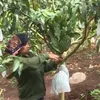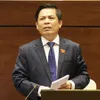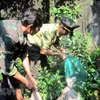PM issued roadmap for SDGs realisation by 2030

According the roadmap issued by Prime Minister Nguyen Xuan Phuc in Decision 681/QD-TTg, strong efforts will made to eradicate all forms of poverty; promoting sustainable agriculture development; ensuring food security, healthy life and welfare for people of all ages; promoting high-quality, fair and comprehensive education, and lifelong-learning opportunities for all people.
Attention will be also paid to promoting gender equality; increasing rights and opportunities for women and girls; ensuring sustainable and comprehensive economic growth, sustainable consumption, and full employment creation; and effectively adapting to climate change and natural disasters.
On May 20, Prime Minister Nguyen Xuan Phuc signed Directive No. 13/CT-TTg on sustainable development, asserting that sustainable development is a consistent policy of the Party and State of Vietnam.
The Government issued Vietnam Agenda 21 in 2004, the sustainable development strategy for 2011-2020 in 2012, and the national action plan implementing Agenda 2030 for sustainable development with 17 goals and 115 specific targets covering economics, social affairs, and the environment from now to 2030.
The viewpoint on sustainable development has been mainstreamed in the 2011-2020 socio-economic development strategy and the 2011-2015 and 2016-2020 socio-economic development plans, the Directive said.
He directed ministries, sectors and the People’s Committee of provinces and centrally-run cities to make the implementation of sustainable development goals as part of their socio-economic development plans while promptly launching support policies for disadvantaged people, ethnic minorities, social policy beneficiaries, and other vulnerable people.
Tags:





